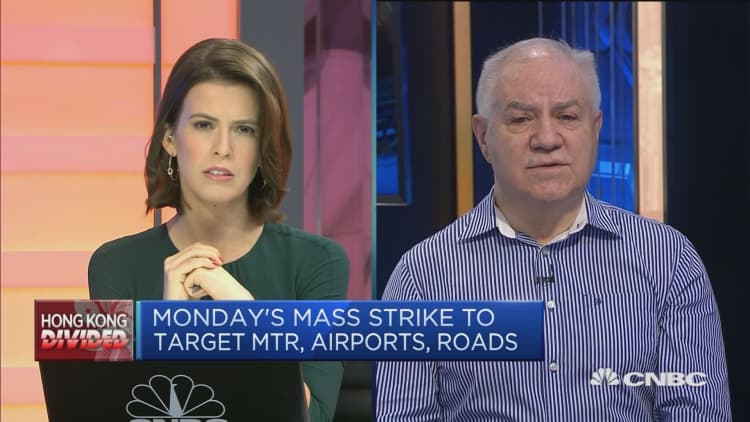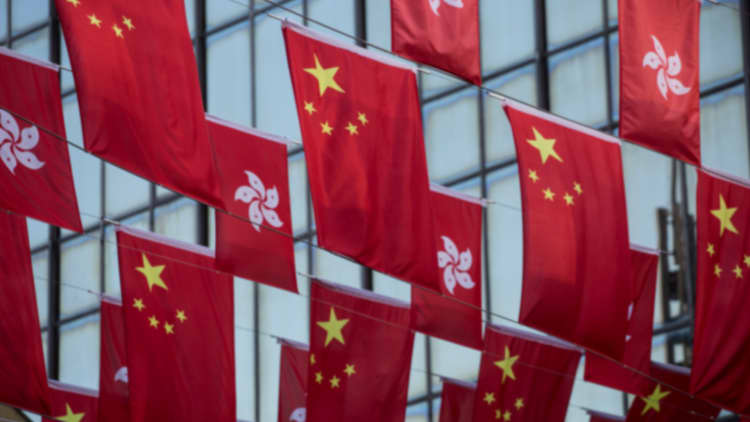
Public frustration over stagnant economic fortunes is helping fuel the increasingly disruptive protests that have coursed through Hong Kong over the last three months, according to a longtime Asia politics watcher.
Speaking to CNBC on Monday, David Dodwell, executive director at HK-APEC Trade Policy Group and former Financial Times Asia correspondent, said the public's discontent toward the city's government has been around for the last 30 years due to wealth stagnation felt by many Hong Kongers.
That, according to Dodwell, has been the root of many public outcries, including the recent protests and the Umbrella Movement in 2014.
Hundreds of thousands of protesters have taken to the streets since early June, spurred by their opposition to a proposed bill that would have allowed people in the city to be extradited to mainland China. The proposal has been suspended — but not fully withdrawn — yet demonstrations continue and have shifted into a movement calling for autonomy, full democracy and the ousting of Hong Kong leader Carrie Lam.
The international business community has recently cited worries about Hong Kong's legal autonomy from Beijing and its financial future, but Dodwell said the population at large has been anxious about the city's economic well being since 1998.
Economic discontent
"There is a very widespread anxiety in Hong Kong among the ordinary working person about their prospects going forward," Dodwell told CNBC. He added that more than 90% of local Hong Kongers work for small and medium-sized enterprises and they have not seen the kind of economic growth that multinationals have.
He added that the city has seen a economically turbulent three decades — "the seeds" of which were planted in 1998 when Asia experienced a significant property crash.
"This is a community that's seen no forward progress in terms of incomes for 30 years," said Dodwell. "And I suppose, in that respect, they share common ground with those unhappy in the U.S. and the U.K."
Dodwell compared the public anger to the underlying sentiments that have been attributed to the poll victories for Donald Trump and the British exit from the European Union. He said the feeling of being economically left behind is at the heart of the problem, but asserted that Hong Kong's leaders seem not to understand.

Hong Kong has been one of the world's preeminent financial hubs for decades but that economic prosperity has largely only made the rich richer, growing the local wealth gap. That was mainly due to tax exemptions and other economic incentives enjoyed by property owners and people with stock investments, said Dodwell.
Looking ahead, Dodwell said he does not think the demonstrations will ultimately harm Hong Kong's long-term economic prosperity. Meanwhile, he predicted that Hong Kong's economic data points this year "are not going to look terribly good," attributing the potential downturn mainly to the U.S.-China trade war, rather than the disruption in Hong Kong.
China's gateway to the world
The longtime China watcher said Hong Kong is not just a financial capital but the city is also an important "headquarter capital." He explained that many Chinese and foreign companies use Hong Kong as their headquarters because of the array of services the city offers.
For Chinese companies, especially, Hong Kong is often the location of choice to employ accounting, legal and financial services, added Dodwell.
Since the 1997 handover of the former British colony to Beijing, China has very much recognized it needs Hong Kong, Dodwell said, adding that had been especially true as China was still opening up to the rest of the world. Even today, "there are a lot of things within China that can't be done in China, and Hong Kong is indispensable for that," he said.


